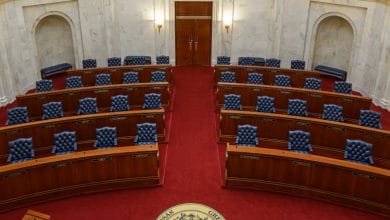The Arkansas Freedom of Information Act of 1967 (FOIA) is under attack. It has always been under attack.
What is FOIA? It is the law that requires state and local governments to hold meetings in public and requires officials to give public notice of those meetings. It is the law that gives citizens the right to inspect government documents. That is why it is known as “the people’s law.”
PURPOSE OF FOIA
The Freedom of Information Act was passed to counteract political machines, especially at the local level, that were doing business through backroom deals while keeping the public in the dark. It was passed as anti-corruption legislation. It was truly a bipartisan effort to clean up government.
Governor Winthrop Rockefeller, a Republican, considered passing the FOIA as one of his crowning achievements as governor. The legislation was sponsored by Democrat legislators and passed by the state legislature which at that time was overwhelmingly made up of Democrat legislators.
In passing the FOIA, the Arkansas General Assembly included an intent statement to explain why the FOIA is crucial for Arkansas and its citizens.
25-19-102. Legislative intent.
It is vital in a democratic society that public business be performed in an open and public manner so that the electors shall be advised of the performance of public officials and of the decisions that are reached in public activity and in making public policy. Toward this end, this chapter is adopted, making it possible for them or their representatives to learn and to report fully the activities of their public officials.
The Arkansas Supreme Court described the FOIA this way:
“It is vital in a democratic society that public business be performed in an open and public manner. We have no hesitation in asserting our conviction that the Freedom of Information Act was passed wholly in the public interest and is to be liberally interpreted to the end that its praiseworthy purposes may be achieved.”
HOW FOIA HAS BEEN ATTACKED
The first battle over the FOIA and your right to open meetings and access to public documents was in the courts. It was in the courts because some politicians didn’t want the public to “interfere” with how they were doing business. The Arkansas Supreme Court upheld the FOIA. Since then the battle has mostly moved from the courts to the State Capitol and to the offices of many local governments.
The FOIA’s protection of the public is under attack in two ways. First, there is a willingness among some officials to ignore open meetings requirements and to delay compliance with open records by forcing the public to go to court to gain public access. Perhaps these officials see the cost of defending and losing FOIA cases as no big deal since the cost of the litigation is borne by taxpayers, not them, and because the penalty for violating the FOIA is very low.
Ignorance of the law does not appear to be the cause of noncompliance. It is not like the FOIA is rocket science or hard to learn about:
- The FOIA has been around for fifty-six (56) years.
- The Arkansas FOIA Handbook, jointly published by the Attorney General and the Arkansas Press Association, is readily available to government officials and the public. It is available in both printed and electronic format. Use the link to view the handbook.
- The staff of the Attorney General’s office makes presentations on FOIA to public officials, to attorneys, and to the general public.
- Cities, counties, and school districts can even reach out to their associations to learn about their experiences and for advice.
The second way the FOIA is under attack is through legislation to weaken the law by adding more exceptions to your right to know. The FOIA has been amended over fifty (50) times. It wasn’t amended much in the first couple of decades, but in recent decades more and more changes have been made. Some of the amendments have been to expand the FOIA, but many amendments have resulted in the rights of citizens to government information being limited. The laws amending the chapter of law known as the Freedom of Information Act of 1967 is only a drop in the bucket. Many other laws have included exemptions to the FOIA by merely referencing the FOIA and saying the subject of the legislation is exempt and avoiding a direct amendment to the FOIA chapter.
Valid reasons are always given for limiting the FOIA, such as the cost associated with looking up and copying documents or the abuse of the FOIA by people who have an axe to grind against some official. Unfortunately, the solutions offered have been worse than the problem because the solutions make it harder for citizens to obtain government information and turns out the light of the FOIA which is necessary to deter corruption.
The FOIA is good for the people and is good government, but compliance can be frustrating for elected officials and bureaucrats. When legislation to relieve some of their frustrations is proposed the question always asked is, “Are you serving the bureaucrats or are you serving the people?”
What are some examples of proposals to respond to the frustrations of bureaucrats? Here are some that came up in 2023. These bills did not pass but are likely to be proposed again in some form in future legislative sessions.
- Exempting documents in the hands of a government entity’s attorney. This restriction was proposed as a way to prevent the other side of lawsuits from gaining an unfair advantage against government entities. Opponents of the exemption say such a provision would allow officials to hide information from the public by shifting documents from government files to the files of their attorneys.
- Charging a fee for providing government documents, or at least on large requests for documents. Proponents of this restriction see it as a way to curtail huge FOIA requests that take up lots of time and that may have been made simply to harass government officials. Opponents say we, as citizens, have already paid the price of having free information through payment of our taxes. Opponents also see the fee proposal as an effort to deter citizens from making valid requests and as having the greatest impact on citizens who are poor but need government information in order to protect their rights. Legislators were reminded of the Huntsville School District where sexual abuse was covered up until FOIA requests eventually brought the horrible situation to light. Legislators were asked how much should a poor parent have to pay in fees to uncover the truth about what happened to their child? .
- Allowing local governing bodies to meet and discuss business as long as a majority of the members (or some other threshold) is not present. Proponents say it is awkward when board members run into one another and aren’t allowed to discuss business informally. Opponents say such an exemption would work as a mechanism for public officials to thwart the purpose of open meetings by allowing the officials to arrive at a decision away from public scrutiny and then rubber stamp the decision in a meeting.
“YES” or “YES, BUT”
Watching hearings at the State Capitol it is clear that everyone is “for” transparency and the FOIA but they are divided into two very different camps. One camp supports the FOIA by opposing anything that would weaken our law. The other camp begins their comments with “I support transparency and the FOIA, however….” and then gives reasons why exceptions should be made for the benefit of bureaucrats.
WHAT DOES THE REPUBLICAN PARTY OF ARKANSAS THINK OF THE FOIA?
Open meetings and open records are so important to the Republican Party of Arkansas that the State Republican Convention put a plank of support in its platform. Under the section on Government Reform the Republican platform of Arkansas says:
“We firmly support transparency and openness at every level of government. Those elected, appointed, and employed in government work for the taxpayers of this state and must provide public information when requested, in line with Arkansas’s Freedom of Information Act.
We support requiring that notice of public meetings be given not only to the press but also directly to the people by posting notices on government websites and social media accounts and sending them by e-mail to interested parties.
We support continuing efforts to make clear to local governments that officials are not to conduct public business outside the parameters of duly noticed public meetings so that the public has the opportunity to see the entire decision-making process and to participate if they so choose.”
ECONOMIC FREEDOM FILTER AND THE PEOPLE’S LAW
After every regular session of the Arkansas General Assembly, Conduit evaluates important legislation and then scores the votes of state legislators. In examining legislation, Conduit uses our Economic Freedom Filter. The filter asks four questions about legislation. Does the legislation:
- Increase or decrease the size and scope of government?
- Increase or decrease dependency on government?
- Spend money we do not have?
- Increase or decrease transparency in government?
Transparency in government is essential in protecting our economic freedom. A lack of transparency leads to waste, cronyism, and sometimes corruption. Therefore, Conduit supports a strong FOIA.
In our future legislative scorecards, CONDUIT will continue to put an emphasis on scoring the votes of legislators on legislation on transparency and the FOIA which truly is “the people’s law.”






